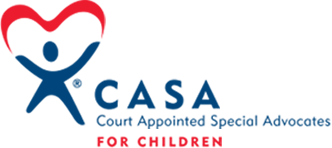July 2022 Advocate Spotlight: Paolina Fasula
 We invite you to meet Paolina Fasula, nominated by Case Supervisor Victoria Warmuth.
We invite you to meet Paolina Fasula, nominated by Case Supervisor Victoria Warmuth.
“Sworn in earlier this year, Paolina has done an incredible job advocating for a teen and tween girl,” Victoria said. “She has a heart of gold and has dedicated countless hours to supporting the girls, driving around Texas to ensure that they are seen and heard.”
We asked Paolina to share about her experiences as an Advocate.
Is there anything unique about your background that contributes to your approach to advocacy?
I’ve been interested in working with kids in need since my early twenties. I taught language arts to at-risk teens for an organization that served kids who had been kicked out of or quit high school to get their high school diploma. Later, while living in Toronto, Canada, I volunteered at a youth homeless shelter and ultimately worked for a city counselor doing community outreach with a variety of child-oriented programs. I’ve spent the last several years volunteering with a lunch-and-learn program, serving underprivileged kids in the Klein area.
How did you become interested in volunteering as AN aDVOCATE?
Years ago, a friend of mine from the lunch-and-learn program told me that she was considering being a CASA in Harris County. I had never heard of CASA. When she told me about it, it sounded interesting but also more time-consuming than I had room for at that point. Now that I have only one child left at home who is entering high school, I felt like I had more time to volunteer and get involved with something important to me. I had a few ideas, but one afternoon last fall at the Woodlands Pride Festival changed everything. I saw a banner for CASA, and I recognized it as the organization my friend told me about years ago. I went to the table and met a lovely young woman, Victoria, who told me all about CASA, answered my many questions, and gave me information to take home. I just knew, after speaking with Victoria, that this is what I wanted to do.
Did you have any reservations about volunteering?
I didn’t have reservations until I went through training and more fully understood what I was going to be doing! I was a little concerned that it would be depressing and hard to make a real difference. But I often think about a story Ann Marie [Ronsman] — previously CASA’s Training Manager, now CASA’s President & CEO — told us during training about her experience working in pediatric oncology. She said that as sad as it was to work with children whose lives may not be saved, she reasoned that if she wasn’t there, those kids would still have cancer… her absence would not change their circumstances. But if she was there for those children, she might be able to help, might be able to make a difference, might be a source of comfort. I think about that story when I feel like there might not be an answer to my case that I feel is fully satisfactory. I try not to feel depressed that I can’t change all of the heartbreaking, unfair circumstances these kids face. Instead, I think about what I can do to be helpful and try to be grateful for even the small wins for my kids.
Explain in your own words the work you do as a CASA aDVOCATE. Why is it important for a child in care?
As a CASA, I try to understand the life circumstances and problems my children are dealing with, then advocate for their best interests, taking into account their needs and wants and the people in their lives who are most likely to be supportive and protective, so that they have a chance to live a happy and productive life.
What has surprised you most about your aDVOCACY work?
I’ve been most surprised by the resiliency of the children in foster care. They are coping with the abuse they have suffered at home, the trauma of being removed from their familiar environments/friends/schools, the insecurity of being placed with strangers, and the uncertainty of their future. I can’t imagine how I would handle that in my own life, and I’m frankly shocked they don’t completely fall apart.
What has been the most difficult aspect of being a casa? Most rewarding?
The most challenging aspect of being a CASA has been dealing with parents who do not always support and care for their children in healthy ways because of their own trauma history. The most rewarding aspects of being a CASA are the connections I am making with people like my supervisor, Victoria, my caseworker, Hope, and many others in the child welfare system who truly care about helping children.
What would you like the community to know about children in care?
Children in care are no less deserving of a safe, healthy home to grow up in than our own children, and it is our job as a community to protect these vulnerable children.
What have you learned about children in care?
There are far more children in care than I realized. There are probably a huge number of children who are not in care and should be. I’ve always felt like the child welfare system needed more resources, but seeing it up close has made me realize that even more.
Is there a particular moment or memory that stands out for you?
What stands out to me is the beautiful building that is home to CASA. I love the history, I love that it is actually a home, and I love the positive energy that I feel from the amazing people who work and volunteer there.
EVERY CHILD DESERVES A CHANCE … IT’S YOU!
Learn more about becoming a CASA volunteer: VOLUNTEER or give online DONATE
